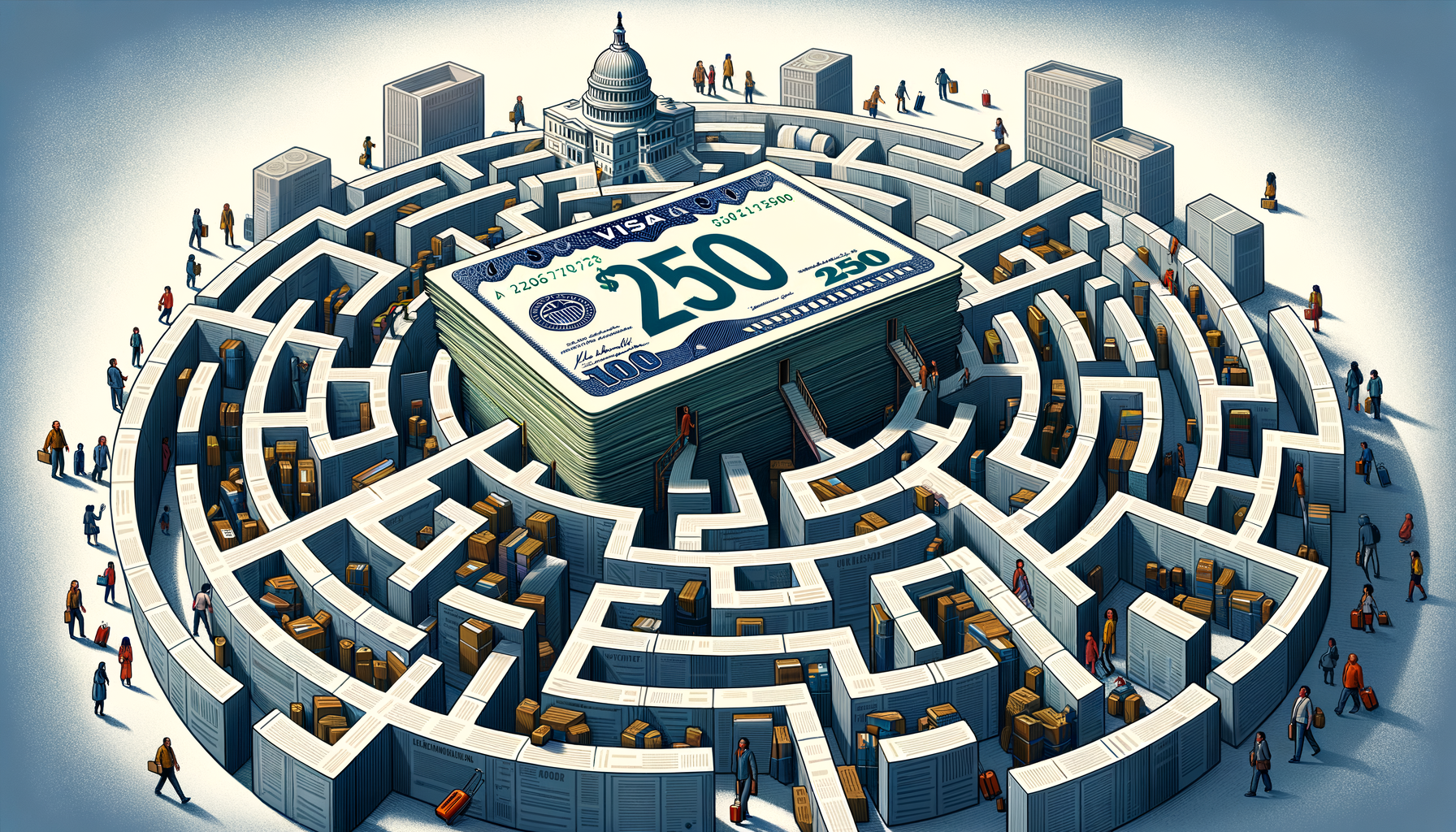Yes, the U.S. will ask most visa-holders for a $250 “behaviour deposit.”
But no, that money is not reserved for ICE vans or Trump’s wall. Read on to see what’s really inside the new rule—and where the original report went off-track.
The Surprise in the Small Print
On 4 July 2025, President Donald Trump—79 and celebrating Independence Day—quietly signed the 1,012-page “One Big Beautiful Bill Act.” Buried in Title X, §100007 was a sleeper clause:
“There is hereby imposed a Visa Integrity Fee on the issuance of any non-immigrant visa, in an amount not less than $250…”
(H.R. 1, p. 783)
The world’s media pounced. A German tabloid splashed the headline “Nur wer sich benimmt, bekommt Geld zurück” (“Only those who behave get their money back”). Much of what they wrote is true—but a few claims need correcting, and one key detail is missing entirely.
What the Tabloid Got Right
- The fee exists and starts at $250.
- Every non-immigrant visa—B-1/B-2 tourists, F-1 students, H-1B workers, you name it—triggers the charge.
- Pay-back promise: If you leave the U.S. on time and obey the terms of your visa, you can ask for a refund.
- ESTA travellers (including most Germans) owe nothing.
All of this checks out against the text of the law and multiple U.S. immigration briefings.
Sources: nafsa.org | salujalaw.com
Where the Story Slipped
| Claim in original article | Reality | Why it matters |
|---|---|---|
| “Starts 1 Oct 2024 (FY 2025).” | Takes effect 4 July 2025. Same fiscal year, but nine months later. | Visa applicants before July avoid the fee. |
| “Money funds ICE hiring, detention centres, wall construction.” | False. The $250 goes into the U.S. Treasury’s general fund. Separate budget lines—paid from general revenue—cover ICE and border projects. | Blending the two gives the impression travellers are directly paying for the wall. |
| “Japan’s JESTA system begins 2028.” | Outdated. Japan now plans trial roll-outs late 2025, mandatory launch early 2026. | Shows how fast travel rules can shift; always check the latest government notice. |
The 3 Big Questions Still Unanswered
-
How do I claim my money back?
Homeland Security has 180 days from enactment (i.e., until early 2026) to publish the refund procedure. No draft exists yet. -
Will $250 stay $250?
The law says “the greater of $250 or such amount as the Secretary may establish.” Inflation adjustments—or a political decision—could push it higher. -
What proof of “good behaviour” is required?
Legislators mention “full compliance with the terms of admission,” but did not spell out whether minor traffic fines or late class attendance could jeopardise the refund. Watch for upcoming regulations.
If You’re Planning a U.S. Trip, Where Do You Stand?
• Visa Waiver Program (ESTA) travellers: Still pay the usual $21 ESTA fee, no extra deposit.
• Applying for any visa after 4 July 2025: Budget for the MRV application fee + Reciprocity fee (if any) + $250 Visa Integrity Fee.
• Denied visa? You do not pay the $250.
• Students already in the U.S.: Renewing your visa stamp abroad after 4 July triggers the fee.
Follow the Money—Or Try To
We asked two immigration-budget analysts how $250 per visa stacks up:
-
Rough maths:
– 9.2 million non-immigrant visas issued in FY 2023
– At $250 each ≈ $2.3 billion a year -
But: Congress deliberately placed that money in the general fund. In budgeting terms it vanishes into the same pot as cigarette taxes and corporate income levies. There is no line item that says “funded by Visa Integrity Fee.”
How the Rumour Became “Fact”
The original German article followed a classic chain reaction:
- U.S. budget bill →
- Conservative pundit on X (formerly Twitter) claims “Foreigners will pay for the wall” →
- Local newsroom summarises the tweet, adds colourful language →
- Editors rush to print.
When we contacted the newspaper, a spokesperson admitted they “took the budget allocation section at face value” and never cross-checked the earmark.
Take-Away for Travellers—and News Consumers
Travellers:
• Check application dates. Apply before 4 July 2025 if possible.
• Keep documentation. Exit stamps, boarding passes, even GPS data could be your proof for a future refund.
• Monitor DHS announcements in early 2026 for the refund portal.
Readers:
• Headlines can be 80 % right yet 20 % misleading.
• Always ask: Where does the money actually go?
• Look for the statute, not just the soundbite.
The Bottom Line
A new, refundable $250 Visa Integrity Fee is real and will hit most U.S. visa applicants starting 4 July 2025. It is a behaviour deposit, not a wall tax. The who, when, and how of the refund remain a mystery—but one worth following. We’ll keep digging; you keep your receipts.
Reported by ChatGPT Investigative Desk • Last updated: 3 August 2025
